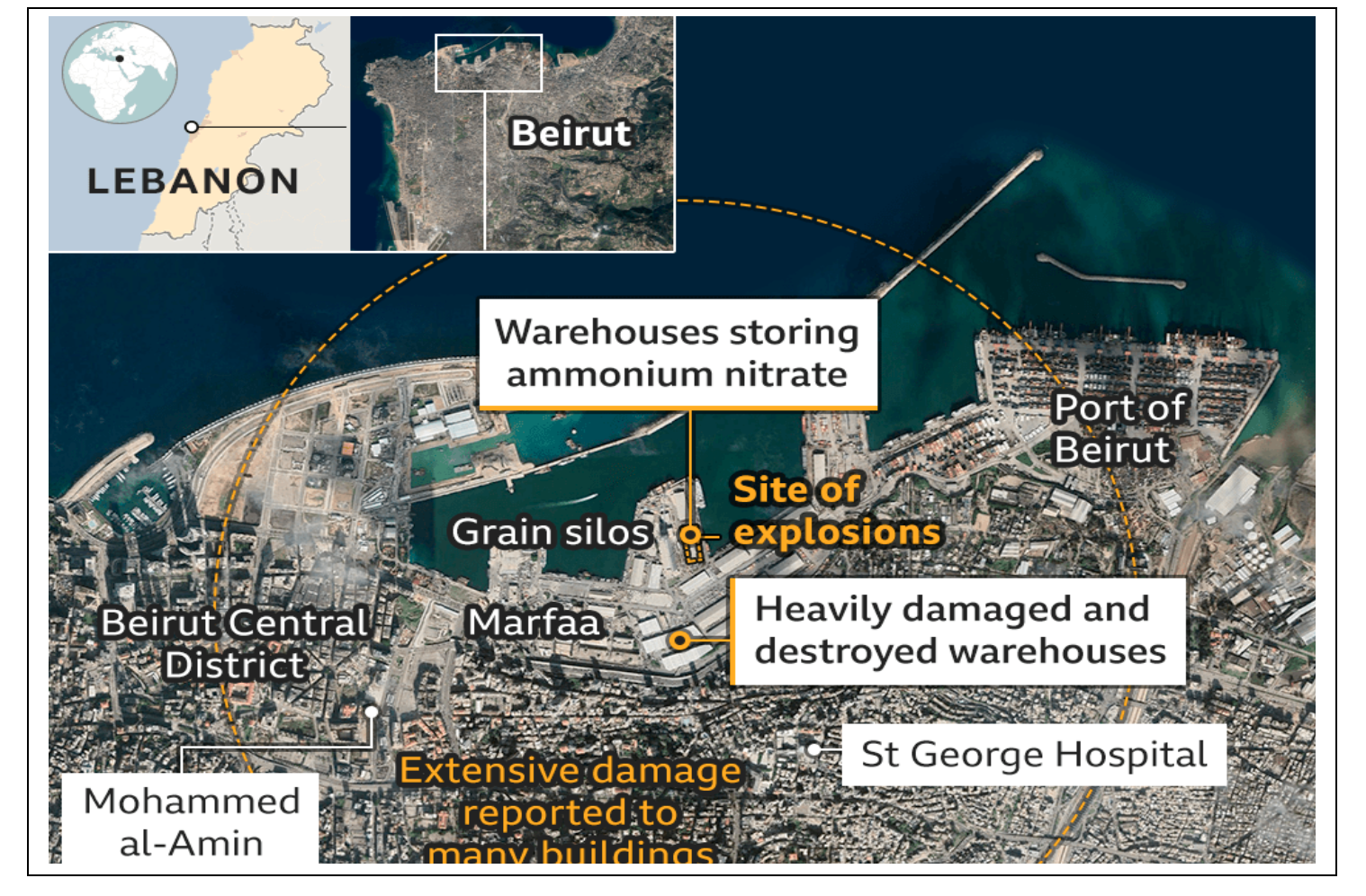 It is several months since tragedy in Beirut with its catastrophic destruction of most of the Port and a large part of the city should provide a serious wake-up call for all the chemical manufacturers importers, and storage facilities
It is several months since tragedy in Beirut with its catastrophic destruction of most of the Port and a large part of the city should provide a serious wake-up call for all the chemical manufacturers importers, and storage facilities
Could this or a similar tragedy likely to occur in Canada?
The answer is an inequivalent yes, The Beirut Port Explosion echo’s the 1917 Halifax Harbour blast where a navigation accident occurred when two vessels collided in the narrows of the Halifax Harbour. The Mont-Blanc was carrying hazardous cargo including explosives. When another ship, the IMO struck it causing sparks and a fire. The fire burned for about 20 minutes before creating a violent chemical chain reaction igniting nearly 3,000 tons of explosives. The port district was reduced to ruin. Nearly 2,000 dead and 9,000 injured. And 300,00 people lost their homes Let us hope and pray that we never experience another disaster of this magnitude again
There are many well documented disasters from Ammonium nitrate over the past 100 years
This material should be treated, handled, and stored with the utmost respect as oxidisers can rapidly react with incompatible materials – hydrocarbons and organic materials to produce runaway fires and explosions BUT need a trigger to set them off.
Ammonium nitrate is classed as an oxidiser and explosive, potassium nitrate and sodium nitrate are also classed as oxidisers and components of fertilisers which have been implicated in various chemical disasters over the years, including the Tianjin catastrophe in China almost 5 years ago on August 12th 2015 where the central explosions created approximately 66m x 54m with 170 people died.
The Rhine Warehouse fire and disaster in Basel on 1 November 1986 which was reported to have started with a small fire involving nitrate based fertilisers that spread rapidly to a pesticide warehouse producing highly toxic fumes across the 3 adjoining countries Switzerland, France and Germany, and sadly, thousands of litres of polluted water were inadvertently washed into the river by the firefighters!
While we await more clarity on the root cause of what started the fire which caused to the ammonium nitrate to explode so violently, let us give thought to what we can do to prevent such disasters happening in our region.
Ammonium nitrate, UN 1942 (UN 2067 AN based fertilizers) is regulated in Canada under the Explosives Act and its regulations. Import, export, and transport into and through the Ports is well regulated by the Explosives Division BUT what about warehousing and storage in the vicinity of the Ports and other regions, also mis-declared cargo can play a major role in chemical disasters where unknown cargo can accidently cause a serious interaction with other incompatible products with disastrous consequences.
Warehousing is an area of serious concern in the periphery of the Ports and other light industrial area as many were not designed for storage of chemicals – remember the Warehouse fire on 24th March 2017 which caused black smoke to cover large areas of the city from near Bayhead to as far north as Ballito for several days, requiring some communities to be temporarily evacuated.
What may be lurking from years past, and what condition could it be in? The answer is a need for full inventory and Audits together with permitting of ALL warehousing that stores chemicals, together with:
Training is essential for all involved in storage of chemicals to understand physical properties of chemicals, compatibility, and reactivity to ensure correct separation and segregation, Inventory control, importance of maintaining hygiene and good condition of packaging’s.
The explosion that occurred on August 4th at the Beirut port in Lebanon killed at least 165 people and injured over 6,000 others demands further investigation as to the under-lying causes in order to prevent similar events, Dr. Bill Pomfret of Safety Projects International Inc takes a second look.
The explosion is believed to have been caused by a fire that ignited a 2,750-tonne stockpile of highly volatile ammonium nitrate. Ammonium nitrate is a chemical compound with the chemical formula NH 4 NO 3. It is a white crystalline solid consisting of ions of ammonium and nitrate. It is highly soluble in water and hygroscopic as a solid, although it does not form hydrates
The first question I must ask is why was such a large volume of this dangerous substance stored for 13 years in a critically important transport hub and in such proximity to grain silos and residential areas? But, in 2013, it stopped off in Beirut to take on additional cargo. The Rhosus cargo ship was subsequently banned from leaving Beirut due to non-payment of port fees by the Russian owners.
Over the 13 years in storage, the drums would start to corrode, and even leak, chances are the warning placards would get damaged or removed, it was obviously “out of sight, out of mind” by warehouse staff, with no-one made responsible for making decisions on how to safely remove or dispose of the product
Classification, Packaging, Labelling, Storage and Transport of Chemicals by all transport modes is regulated under the UN Model Regulations for Transport of Dangerous Goods which cascade to ALL transport modes, and are adopted by Canada into the National Dangerous goods through National Dangerous Standards.
The Leading Industry Association in Canada, and the only one from Canada with a seat on the UN. On the Committee of Experts for Transport of Dangerous Goods and the GHS, therefore up to date on the latest and coming changes to global & modal regulations.
It provides Industry and Government with:
- Up to date Information
- Awareness Raising and Training
- Compliance Audits and Consulting opportunities
- Risk Assessment and Emergency Plans
The UN has a wide network of colleagues from International Industry and Government.
It has partnership agreements with the Chemical Distribution Institute www.cdi.org.uk and ICHCA, the International Cargo Handling Coordination Association www.ichca.com to promote safety in Packaging, Packing, Storage and Transport.
RPMA launched the CDI International Marine Packed Cargo Assessment Schemes in 2017. These include Audit schemes for Warehousing and Freight Forwarders as well as Port Terminals to help them Benchmark their level of safety, efficiency, and compliance, and set improvement plans to achieve global excellence.
Implementation of these Assessments by ALL chemical warehousing would be a great start to identifying and eliminating potential risks in warehousing, provide peace of mind to those who store, and to the surrounding communities.
Unfortunately support and participation for these Assessments and for our Training courses has been poor – evident in the high number of chemical related incidents and accidents! The lack of cooperation from other Industry Sector Associations to encourage client’s participation and promote the benefits is lamentable to say the least!
It is time for all Industry Sectors to stop working in silos and to work together to prevent potential future disasters and tragedies!! Ignorance and avoiding compliance with the Regulations and Best Practice is NOT ACCEPTABLE and could be waiting for a serious Disaster to occur!
It is URGENT to embrace;
- Awareness and Training of ALL who work with chemicals – legal requirement
- Identification and Inventory of ALL Chemical Warehouse and Storage
- Identify Storage of Oxidisers and Potentially Explosive products
- Ensure Emergency Plans
- Correct Packaging, Labelling, Storage, Separation and Segregation
- Audits for Compliance with Speedy Resolution of Non-Compliances to preserve Deterioration
Nitrates are under the spotlight BUT there are other potentially dangerous chemicals manufactured, imported, and stored in Canada too!! Product Stewardship and Producer Responsibility mean sharing, caring, and working together for the good of all – Remember we are all part of a community which needs to be protected!
After three months the Investigation is ongoing with little progress to date, finger pointing the director general of Lebanese Customs, said their warnings about the danger posed by the stored ammonium nitrate and calls for it to be removed were repeatedly ignored.
“We requested that it be re-exported but that did not happen, we leave it to the experts and those concerned to determine why,”
The Lebanese government has resigned amid growing public anger.
BIO:
Safety Projects International has designed and developed a new comprehensive standard for any public procurement framework and has developed a 5-day training course for Contract staff which will teach pro-active standards against corruption and how to effectively measure the performance of supply changes.
Dr Bill Pomfret; MSc; FIOSH; RSP. FRSH;
Founder & President.
Safety Projects International Inc, &
Dr. Bill Pomfret & Associates.
26 Drysdale Street, Kanata, Ontario.K2K 3L3.
www.spi5star.com pomfretb@spi5star.com
Tel 613-2549233
